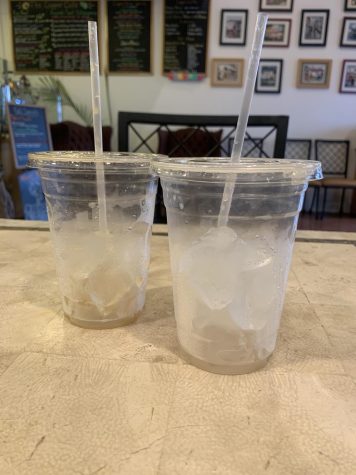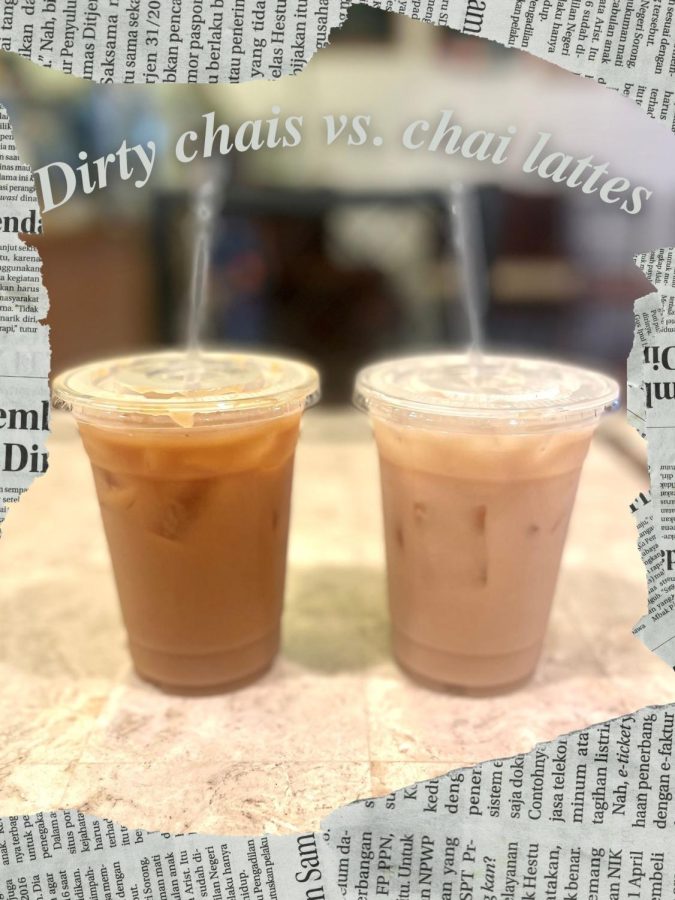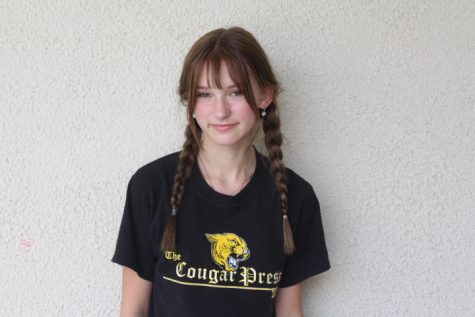For and against: Dirty chais vs. chai lattes
Both drinks are incredibly delicious that we both have to drink them until they are empty. Photo by: Summer Williams
November 10, 2022
The battle between these iced beverages begins
Dirty chais: by Summer Williams
Dirty chai lattes may be similar in concept to a regular, boring old chai, but they are so much more than that. A dirty chai has one major key difference compared to the plain, overdone chai latte– espresso. The smooth one or two shots of espresso are what makes the dirty chai “dirty.”
Regarding the two beverage’s prices, Lily Carnaghe ‘24 said, “I think there’s a slight price difference because a shot of espresso is like 50 cents.”
The Copper Coffee Pot Cafe, a local coffee shop which sells both the dirty chai latte and the regular chai latte, charges $4.90 for the regular chai latte, while the dirty chai costs $5.40.
In my opinion, 50 cents is such a miniscule difference in price for such an exquisite drink.
Carnaghe said, “[I prefer making] iced chai because I don’t have to pull a shot of espresso.”
While it may have the extra step of adding espresso, this step is so worth it for a dirty chai. The espresso brings special bitterness to the spiced tea that makes the experience of drinking it unmatched.
Both chai tea and espresso have long histories, with each carrying cultural significance. Chai is speculated to have originated in India from an ancient king for a traditional medicinal practice where spices and herbs are used for healing purposes. Espresso originated in Venice, Italy, where businessman Luigi Bezzera, who was experimenting with coffee to see how he could make his brew faster, came up with an espresso.
To this day both chai tea and espresso are big parts of the culture they originate from, creating lasting impacts all over the world. Having both these exquisite drinks mixed into one is truly the best of both worlds in my opinion.
In the end, both drinks are incredibly enjoyable to drink and we both agree that we will finish anything with the word “chai” in it. We love the cinnamon and clove as it accentuates the creaminess of the milk and tea. Whether you are a coffee connoisseur or not, you can always give dirty chai a chance.

Chai lattes: by Alexis Segovia
Chai lattes are a work of art. In simple terms, chai lattes describe steamed milk with black tea infused with spices such as clove and cinnamon. However, those are just the basics of the drink. What is unseen is the experience of drinking a simple yet elegant chai latte. It first starts with the drink being served to you. The cold icy cap on the plastic cup brings a promise of comfort as you taste the cinnamon that balances out the milk and cloves. Adding another factor to it would be a huge mistake. As the common phrasegoes, “why fix it if it is not broken?”
The espresso included in the dirty chai makes the process of receiving your drink slower. baristas have to wait for the espresso to brew as well as having to mix it into the drink.
Carnaghe said, “[It] depends on how busy it is but usually like 10 seconds [to make a chai latte]. Regular chai is faster [compared to dirty chai] though.”
By the time your dirty chai is in your hand, it’s still not ready to sip from– you have to grab your straw and stir it because the espresso has sunk to the bottom. Personally, it is much more delightful being able to savor a drink as soon as possible.
With the regular chai latte, there is no stirring involved, and it is simply a matter of how long baristas will take to make it. Even so, the process will always be faster than having to make a dirty chai.
Now, how much are you willing to pay for coffee? Although this factor varies from individual to individual, the price of a dirty chai will typically be higher due to the ingredients in it (steamed milk with black tea infused with spices such as clove and cinnamon).
Ultimately, it comes down to the person ordering whether or not they want to spend that much money on a dirty chai.
Jenny Truong ‘23 said, “I’m not a coffee fan, and I just like regular chai better by itself.”
As simply as Truong describes it, many people love chai by itself without the coffee. The coffee overpowers the chai, making the sweet cinnamon become lost in the shocking espresso as you take the first sip. Personally, the chai latte will always outcompete the dirty chai. Was it even a competition in the first place?











